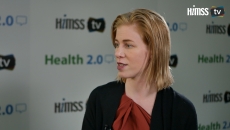Artificial Intelligence
For their first new post-acquisition technology, 3M Health Information Systems and M*Modal have unveiled a clinical documentation improvement tool that uses artificial intelligence to boost speed and efficiency for clinicians and coders.
"And it is coming quickly to a care setting near you," said Cris Ross at Health 2.0 on Tuesday, touting "small AI and big AI" tools that can help revamp IT systems to improve the experience of clinicians and patients alike.
Pophealth
The prescriptive analytics company will start by helping researchers the Novant Health Institute of Innovation & Artificial Intelligence reduce readmissions for congestive heart failure.
An interview with Richard Staynings, Chief Security Strategist, Cylera.
Based in Palo Alto, the VA hopes to use the area’s high-tech cred to make advances in health IT.
James Vlahos, contributor to Wired and other magazines, describes how the Dadbot conversational chatbot provides a sort of "digital afterlife."
At Health 2.0, National Coordinator for Health IT Dr. Donald Rucker and other clinical IT leaders explore the root causes of the burnout epidemic – and offer a wishlist of tech innovations that could help.
Medal co-founder and CEO Lonnie Rae Kurlander says her company's collaboration platform for common workflows translates a wide variety of formats into FHIR data to be exported downstream.
The platform, Critical Care Suite, developed in partnership with UC San Francisco and powered by GE's Edison AI technology, can help radiologists prioritize cases involving collapsed lungs.
Researchers used open source technology from IBM Watson to build an AI model that would ingest clinical data from de-identified sepsis patient EHR data, then used it to predict patient mortality during hospitalization and during the 90 days following discharge.

